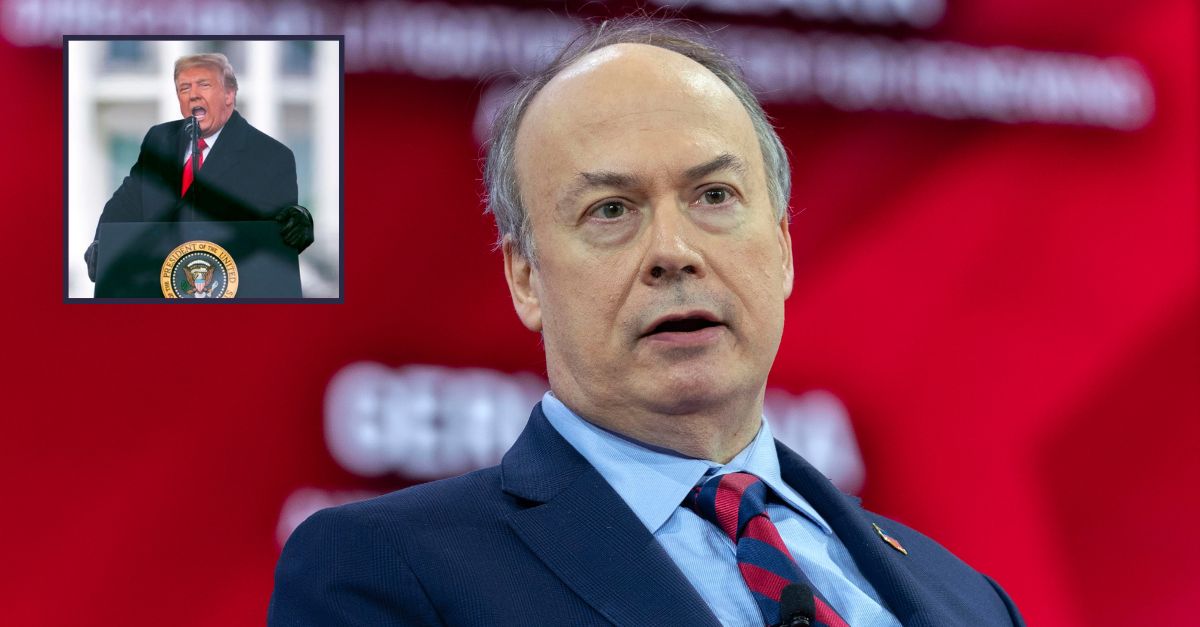
Inset: Donald Trump speaks during a rally in 2021 (AP Photo/Evan Vucci, File). Background: Jeffrey Clark speaks during the Conservative Political Action Conference in 2024 (AP Photo/Jose Luis Magana).
Attorneys for former U.S. Department of Justice attorney Jeffrey Clark on Wednesday told a federal court their client was “unindictable” in criminal cases emanating from the Jan. 6 attack on the U.S. Capitol.
In a two-page letter addressed to the clerk of the U.S. Court of Appeals for the District of Columbia, Clark’s lead lawyer in his D.C.-based bar discipline case cited “supplemental authority” for a recently scuttled effort to transfer disbarment proceedings to federal court.
The filing is the latest knock-on effect of the U.S. Supreme Court’s blockbuster midsummer ruling on presidential immunity. The ruling created anew two forms of criminal immunity for U.S. presidents and explicitly provided such immunity to former president Donald Trump.
In an effort to salvage and fast-track the Jan. 6 conspiracy case against Trump – which was returned to the jurisdiction of U.S. District Judge Tanya Chutkan early this month – special counsel Jack Smith filed a superseding indictment on Tuesday afternoon. The new version lacks several pages worth of references to various individuals and topics that previously appeared in the first indictment, which was roughly nine pages longer than the present charging document.
Most of those deletions focused on references to what prosecutors called Trump’s discussions with “senior leaders of the Justice Department.” This bespoke process of elision closely tracks with Chief Justice John Roberts termed Trump’s “discussions with Justice Department officials.” In the landmark opinion stylized as Trump v. United States, the nation’s high court expressly granted Trump “absolute immunity” for anything having to do with the DOJ. Full stop.
“The superseding indictment is the Special Counsel’s response to the Supreme Court’s decision in Trump v. United States,” the letter by Clark’s attorney, Harry MacDougald helpfully explains.
The letter goes on:
Consistent with the immunity doctrines set forth in Trump v. U.S., the superseding indictment deletes entirely all allegations relating to the President’s official acts, including and especially those with the Department of Justice and Mr. Clark. Mr. Clark had been unindicted co-conspirator #4 in the original Special Counsel indictment. The issuance of a new indictment handed down by a new grand jury effectively concedes that Mr. Clark is not just unindicted, but unindictable.
More Law&Crime coverage: Jack Smith files superseding indictment in Trump Jan. 6 case with new grand jury to navigate around SCOTUS immunity decision
The letter itself amounts to a late-game effort to change the calculus as Clark attempts to have his removal effort adjudicated by the full D.C. Court of Appeals – in what is known as an “en banc” request.
In July, a three-judge panel of the appellate court shot down efforts to remove various bar disciplinary proceedings to federal court.
Clark’s law license is on the line over his efforts to help Trump overturn the results of the 2020 presidential election. The proceedings in the case against the lawyer are long delayed — the D.C. Bar Office of Disciplinary Counsel filed ethics charges against him in July 2022.
An environmental lawyer by trade, Trump nearly tapped Clark to be acting attorney general in his scramble to retain the presidency after losing to Joe Biden in the 2020 election. He also previously worked as an assistant attorney general at one sub-agency within the DOJ and as an acting assistant attorney general within another.
In April, after various false starts and a hearing during which the lawyer repeatedly invoked the Fifth Amendment, D.C.’s Office of Disciplinary Counsel found Clark’s “dishonest attempt to create national chaos” was a betrayal of his oath and advised disbarment.
More Law&Crime coverage: Jack Smith warns Trump’s alleged co-conspirators they can’t hide behind SCOTUS-granted immunity for their ‘private’ acts with the former president in Jan. 6 case
Now, with the final decision on Clark’s ability to practice law pending, his attorneys argue the superseding indictment filed by the special counsel earlier this week is a great boon to their cause.
“The superseding indictment’s deletion of these allegations as required by Trump v. U.S. bolster’s Mr. Clark’s immunity and evidentiary arguments as they tie into his pending petition for rehearing en banc, which argues that Mr. Clark’s removal of a quasi-criminal bar discipline matter was timely,” the letter continues.
The three-judge panel earlier said Clark’s disciplinary hearing was not removable at all – and even if it was, the request was “untimely.” Similarly, the panel rejected claims that an attorney discipline proceeding is “quasi-criminal in nature.”
Central to Clark’s latest argument is the constitutional way in which courts are formed in the United States.
As an administrative adjunct, or arm, of the D.C. Court of Appeals, the disciplinary counsel qualifies as an Article I court. Oppositely, the appellate court itself is considered an Article III court.
“The entire key purpose of removal is to allow Mr. Clark to obtain an Article III court adjudication of his immunity defenses and for such immunity defenses not to be adjudicated by an Article I court (or by a state court, had Mr. Clark’s jurisdiction of bar licensure been different),” the Wednesday letter concludes. “The hostility shown in the District Court below and before the panel to allowing removal jurisdiction to attach to a bar disciplinary matter is thus misplaced.”
In other words, Clark is saying his immunity arguments must be heard by an actual federal court – and that the bar disciplinary body lacked the necessary authority to review such claims.
The Court of Appeals has not given any indication as to when they might issue their final decision on Clark’s case.
Have a tip we should know? [email protected]







